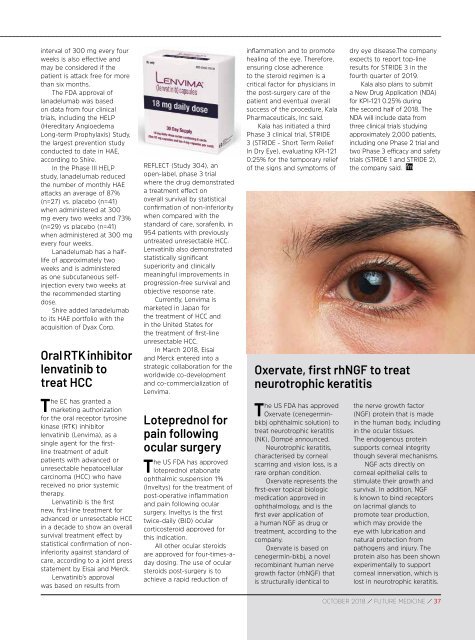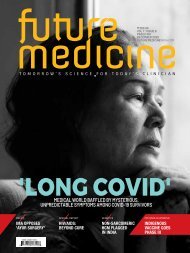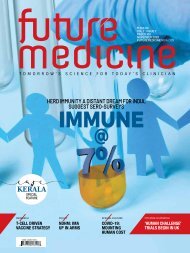You also want an ePaper? Increase the reach of your titles
YUMPU automatically turns print PDFs into web optimized ePapers that Google loves.
interval of 300 mg every four<br />
weeks is also effective and<br />
may be considered if the<br />
patient is attack free for more<br />
than six months.<br />
The FDA approval of<br />
lanadelumab was based<br />
on data from four clinical<br />
trials, including the HELP<br />
(Hereditary Angioedema<br />
Long-term Prophylaxis) Study,<br />
the largest prevention study<br />
conducted to date in HAE,<br />
according to Shire.<br />
In the Phase III HELP<br />
study, lanadelumab reduced<br />
the number of monthly HAE<br />
attacks an average of 87%<br />
(n=27) vs. placebo (n=41)<br />
when administered at 300<br />
mg every two weeks and 73%<br />
(n=29) vs placebo (n=41)<br />
when administered at 300 mg<br />
every four weeks.<br />
Lanadelumab has a halflife<br />
of approximately two<br />
weeks and is administered<br />
as one subcutaneous selfinjection<br />
every two weeks at<br />
the recommended starting<br />
dose.<br />
Shire added lanadelumab<br />
to its HAE portfolio with the<br />
acquisition of Dyax Corp.<br />
Oral RTK inhibitor<br />
lenvatinib to<br />
treat HCC<br />
The EC has granted a<br />
marketing authorization<br />
for the oral receptor tyrosine<br />
kinase (RTK) inhibitor<br />
lenvatinib (Lenvima), as a<br />
single agent for the firstline<br />
treatment of adult<br />
patients with advanced or<br />
unresectable hepatocellular<br />
carcinoma (HCC) who have<br />
received no prior systemic<br />
therapy.<br />
Lenvatinib is the first<br />
new, first-line treatment for<br />
advanced or unresectable HCC<br />
in a decade to show an overall<br />
survival treatment effect by<br />
statistical confirmation of noninferiority<br />
against standard of<br />
care, according to a joint press<br />
statement by Eisai and Merck.<br />
Lenvatinib's approval<br />
was based on results from<br />
REFLECT (Study 304), an<br />
open-label, phase 3 trial<br />
where the drug demonstrated<br />
a treatment effect on<br />
overall survival by statistical<br />
confirmation of non-inferiority<br />
when compared with the<br />
standard of care, sorafenib, in<br />
954 patients with previously<br />
untreated unresectable HCC.<br />
Lenvatinib also demonstrated<br />
statistically significant<br />
superiority and clinically<br />
meaningful improvements in<br />
progression-free survival and<br />
objective response rate.<br />
Currently, Lenvima is<br />
marketed in Japan for<br />
the treatment of HCC and<br />
in the United States for<br />
the treatment of first-line<br />
unresectable HCC.<br />
In March <strong>2018</strong>, Eisai<br />
and Merck entered into a<br />
strategic collaboration for the<br />
worldwide co-development<br />
and co-commercialization of<br />
Lenvima.<br />
Loteprednol for<br />
pain following<br />
ocular surgery<br />
The US FDA has approved<br />
loteprednol etabonate<br />
ophthalmic suspension 1%<br />
(Inveltys) for the treatment of<br />
post-operative inflammation<br />
and pain following ocular<br />
surgery. Inveltys is the first<br />
twice-daily (BID) ocular<br />
corticosteroid approved for<br />
this indication.<br />
All other ocular steroids<br />
are approved for four-times-aday<br />
dosing. The use of ocular<br />
steroids post-surgery is to<br />
achieve a rapid reduction of<br />
inflammation and to promote<br />
healing of the eye. Therefore,<br />
ensuring close adherence<br />
to the steroid regimen is a<br />
critical factor for physicians in<br />
the post-surgery care of the<br />
patient and eventual overall<br />
success of the procedure, Kala<br />
Pharmaceuticals, Inc said.<br />
Kala has initiated a third<br />
Phase 3 clinical trial, STRIDE<br />
3 (STRIDE - Short Term Relief<br />
In Dry Eye), evaluating KPI-121<br />
0.25% for the temporary relief<br />
of the signs and symptoms of<br />
dry eye disease.The company<br />
expects to report top-line<br />
results for STRIDE 3 in the<br />
fourth quarter of 2019.<br />
Kala also plans to submit<br />
a New Drug Application (NDA)<br />
for KPI-121 0.25% during<br />
the second half of <strong>2018</strong>. The<br />
NDA will include data from<br />
three clinical trials studying<br />
approximately 2,000 patients,<br />
including one Phase 2 trial and<br />
two Phase 3 efficacy and safety<br />
trials (STRIDE 1 and STRIDE 2),<br />
the company said.<br />
Oxervate, first rhNGF to treat<br />
neurotrophic keratitis<br />
The US FDA has approved<br />
Oxervate (cenegerminbkbj<br />
ophthalmic solution) to<br />
treat neurotrophic keratitis<br />
(NK), Dompé announced.<br />
Neurotrophic keratitis,<br />
characterised by corneal<br />
scarring and vision loss, is a<br />
rare orphan condition.<br />
Oxervate represents the<br />
first-ever topical biologic<br />
medication approved in<br />
ophthalmology, and is the<br />
first ever application of<br />
a human NGF as drug or<br />
treatment, according to the<br />
company.<br />
Oxervate is based on<br />
cenegermin-bkbj, a novel<br />
recombinant human nerve<br />
growth factor (rhNGF) that<br />
is structurally identical to<br />
the nerve growth factor<br />
(NGF) protein that is made<br />
in the human body, including<br />
in the ocular tissues.<br />
The endogenous protein<br />
supports corneal integrity<br />
though several mechanisms.<br />
NGF acts directly on<br />
corneal epithelial cells to<br />
stimulate their growth and<br />
survival. In addition, NGF<br />
is known to bind receptors<br />
on lacrimal glands to<br />
promote tear production,<br />
which may provide the<br />
eye with lubrication and<br />
natural protection from<br />
pathogens and injury. The<br />
protein also has been shown<br />
experimentally to support<br />
corneal innervation, which is<br />
lost in neurotrophic keratitis.<br />
<strong>OCTOBER</strong> <strong>2018</strong> / FUTURE MEDICINE / 37


















